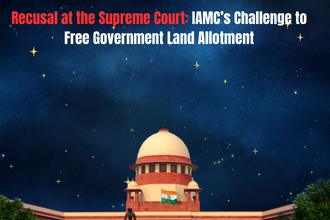In a significant ruling clarifying the scope of the Prevention of Corruption (PC) Act, the Supreme Court of India has held that licensed stamp vendors are public servants under the Act owing to the nature of their duties and the remuneration received from the government. However, in a twist, the Court acquitted the accused, Aman Bhatia, for lack of evidence proving a bribe demand, thereby reinforcing legal safeguards against wrongful convictions.
The judgment was delivered by a Bench comprising Justices JB Pardiwala and R Mahadevan in the case of Aman Bhatia v. NCT of Delhi, involving allegations of corruption against a stamp vendor in a 2003 case. The Court used the opportunity to deliver an authoritative interpretation of Section 2(c)(i) of the PC Act and its application to non-traditional public service roles.
Stamp Vendors Perform Public Duty: SC’s Broad Interpretation of ‘Public Servant’
The Supreme Court emphasized a purposive and expansive interpretation of the term “public servant” under Section 2(c)(i) of the PC Act, noting that stamp vendors play a pivotal role in revenue collection, which is a core governmental function. According to the Court:
“Stamp vendors across the country, by virtue of performing an important public duty and receiving remuneration from the Government for the discharge of such duty, are undoubtedly public servants within the ambit of Section 2(c)(i) of the PC Act.”
The Court elaborated that the nature of the duty performed — not merely the mode of appointment or manner of remuneration — is crucial in determining whether an individual qualifies as a public servant under anti-corruption laws.
How the Court Interpreted Section 2(c)(i) of the PC Act
Section 2(c)(i) of the PC Act defines a “public servant” to include:
- A person in government service;
- A person paid by the government; and
- A person remunerated by fees or commission for performing any public duty.
The Court observed that licensed stamp vendors purchase stamps at a discount from the government treasury, and this discount serves as their remuneration. This setup, as governed by the Delhi Province Stamp Rules, 1934, establishes a commission-based public duty framework.
In the words of the Bench:
“The role being performed by a licensed stamp vendor is nothing short of a highly important public duty, essential for ensuring the efficient collection of revenue on behalf of the State.”
This functional approach to the definition of a public servant marks a progressive step in interpreting anti-corruption law, allowing courts to hold accountable those who may fall outside the formal bureaucratic structure but are nonetheless integral to the administration of state functions.
The Case Against Aman Bhatia: A Stamp Vendor Accused of Corruption
The appeal before the Supreme Court arose from a 2003 case in which Aman Bhatia, a licensed stamp vendor in Delhi, was caught allegedly accepting ₹12 for a ₹10 stamp paper, triggering prosecution under Sections 7 and 13(1)(d) of the PC Act.
In 2013, Bhatia was convicted and sentenced to six months of rigorous imprisonment by a trial court. His appeal before the Delhi High Court was dismissed, with the High Court holding that a stamp vendor qualifies as a public servant under the PC Act.
Bhatia then approached the Supreme Court, challenging both his status as a public servant and the corruption conviction.
SC Acquits Bhatia: Demand for Bribe Is a Sine Qua Non for Conviction
While upholding the view that a stamp vendor qualifies as a public servant, the Supreme Court set aside Bhatia’s conviction, citing a crucial procedural safeguard under the PC Act — the need to prove demand for a bribe.
The Court reiterated a well-established principle in anti-corruption jurisprudence:
“It is well-settled that mere recovery of tainted money, by itself, is insufficient to establish the charges under the PC Act. To sustain a conviction under Section 7 or Section 13(1)(d), it must be proved beyond reasonable doubt that the public servant voluntarily accepted the money knowing it to be a bribe.”
After reviewing the trial record, the Court found no credible evidence establishing that Bhatia had demanded illegal gratification. Consequently, the benefit of the doubt went to the accused, and the conviction was quashed.
Implications of the Judgment: Broader Accountability, Stronger Safeguards
This Supreme Court ruling carries far-reaching implications for public administration and anti-corruption law in India:
1. Broader Coverage Under the PC Act
By recognizing that stamp vendors — despite being licensed, commission-based agents — fall within the ambit of “public servant,” the Court has broadened the scope of accountability under the PC Act. Similar logic may now apply to other government-authorized agents, such as:
- Fair price shop licensees,
- Notified private security agencies,
- Contractors handling government functions.
2. Demand for Bribe Is Still Crucial
While the scope of “public servant” is broadened, the threshold for conviction under corruption laws remains high. The judgment reiterates that mere possession or recovery of money is not enough. Demand and voluntary acceptance of the bribe must be clearly proven.
3. Reinforcement of Legal Protections for the Accused
The Court’s insistence on strict standards of evidence preserves the rights of the accused and reinforces that anti-corruption laws, while stringent, must also be applied fairly and justly.
Legal Representation and Courtroom Proceedings
The petitioner Aman Bhatia was represented by Senior Advocate SK Rungta, along with Advocate on Record Rameshwar Prasad Goyal. The State of NCT of Delhi was represented by Additional Solicitor General Aishwarya Bhati.
Conclusion
The Supreme Court’s verdict in Aman Bhatia v. NCT of Delhi is a landmark judgment in the interpretation of the Prevention of Corruption Act. It strikes a careful balance between extending the law’s reach to non-traditional public agents like stamp vendors and upholding the fundamental principles of criminal justice, such as the presumption of innocence and the requirement of proving guilt beyond reasonable doubt.
As governance mechanisms evolve and governments increasingly rely on third-party agents for public service delivery, this judgment lays the groundwork for a wider yet constitutionally sound framework of accountability under India’s anti-corruption laws.


